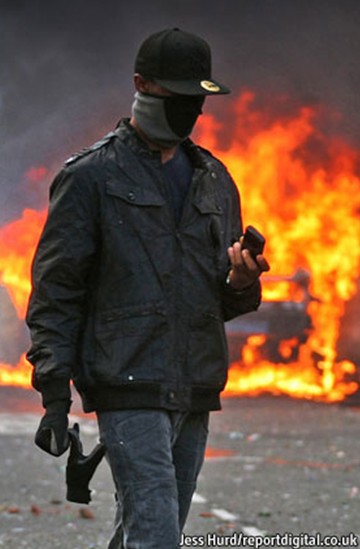
『暴亂者使用黑莓手機對付警方,警方能以其人之道,還治其人之身嗎?』
Technology and disorder: The BlackBerry riots
科技與暴亂:黑莓手機助長英國暴亂
Aug 13, 2011 | From The Economist

AS BRITONS ask themselves what has changed in their country that might have caused these riots, one obvious answer stands out: technology. The digital revolution allows people to organise against the authorities—not just in the Middle East, but also in Britain.
The communications tool of choice for rioters has been the BlackBerry. It has 37% of the teenage mobile market. Young people like its BlackBerry Messenger (BBM) feature, which allows users to send free messages to individuals, or to all their contacts at once. It was used to summon mobs to particular venues. David Lammy, the MP for Tottenham, has called for BBM to be suspended.
The rioters use BBM against the police. But can the police use it against the rioters? Research in Motion (RIM), the firm behind the BlackBerry, and the mobile operators hold at least one, and probably two, sorts of useful information. The first is traffic data: who messaged whom, when and from where. Used in conjunction with CCTV pictures, that could well help police put names to faces—though if many of the rioters were using pay-as-you-go phones, it will prove less useful, as it is harder to track their owners down.
Security experts say it is pretty clear that the law empowers police to demand that phone companies hand over traffic information. The Data Protection Act, which normally prevents companies from sharing such information, has a get-out clause for cases where it is clear that a crime has been committed. The legal position is less clear when it comes to the actual content of messages.
BlackBerry messages are widely thought to be tightly encrypted. But that is the case only for BlackBerrys tied to corporate networks. The security on BlackBerrys sold to individuals is no tighter than for normal phones, according to Richard Clayton of the University of Cambridge; and copies of the messages sent on them should still exist.
Handing content over could, however, cause problems for RIM and the phone companies. Revealing such information to the police could be bad for business; they might be sued for breach of confidentiality. The police could issue warrants, but it is not clear whether they have the power to intercept phone messages en masse.
But the biggest problem, says Ross Anderson, also of Cambridge university, is that police computer forensics departments are chronically under-resourced. “All they can do is kiddie porn, terrorism and murder. They don’t even bother with bank fraud,” he says. “There’ll be petabytes of traffic data and CCTV data. They won’t be able to cope. If you want the surveillance society to become a reality, you’re going to have to increase budgets by an order of magnitude.” (446 words)
特別聲明:①凡本網注明稿件來源為"原創"的,轉載必須注明"稿件來源:育路網",違者將依法追究責任;
②部分稿件來源于網絡,如有侵權,請聯系我們溝通解決。
25人覺得有用
24
2011.10
『亞洲女性拒絕婚姻,這種現象有嚴肅的社會含意。』 The decline of Asian marriage:Asia's lone......
24
2011.10
『遠離高等教育在當今社會越來越成為一種時尚,我們的社會為何如此鋌而走險?』Everyone Should Go to......
24
2011.10
『交通問題,一直以來都是歷屆奧運會舉辦城市難以攻破的難題。倫敦——2012年奧運會舉辦城市......
24
2011.10
『管住嘴,邁開腿,這一減肥方法并沒有使胖子們成功減肥,而最新研究提出了解讀減肥這一難題的新模式。......
24
2011.10
『律師們謹慎地控制著本行業中律師的數量,如此一來,他們便可以推高自己的工資了。』 Barriers to......
24
2011.10
『大學學位不再保證衣食無憂的生活。』 Angst for the educated 為受教育者感到擔憂 Sep 3rd......